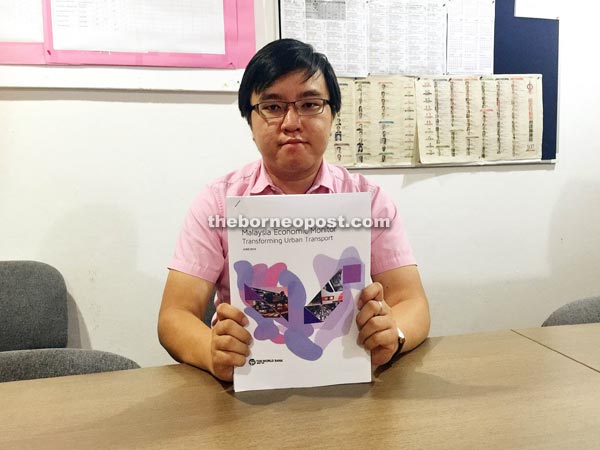
Phoong showing the World Bank Report June 2015 edition which highlights transportation issues in Kota Kinabalu and Kuala Lumpur as major economic hindrance.
PENAMPANG: The ever increasing traffic congestion in Kota Kinabalu has become a more serious problem than we may have thought.
As it causes people to spend more time behind the wheel and burn more fuel, the problem is a drain on the city’s economy and could potentially be the biggest obstacle hindering its progress in the future.
A report by the World Bank comparing Kota Kinabalu and Kuala Lumpur revealed that the smaller city actually fared worst in some aspects when it came to traffic issues.
Democratic Action Party (DAP) Sabah Public Policy Bureau director Phoong Jin Zhe, in sharing the report, noted that transportation costs in Malaysian cities were high compared to other East Asian cities.
Compared to other countries, Malaysians spend a relatively large amount on transport costs and for us in Kota Kinabalu, it represents about 10 per cent of our household expenditures.
This is shockingly higher than Kuala Lumpur and any other cities in Malaysia, and 59 per cent higher than East Asian countries such as Tokyo and Hong Kong.
“In a never-been-done-before report, the World Bank used Greater Kuala Lumpur (GKL) and Greater Kota Kinabalu (GKK) as their case studies. This is very rare that Kota Kinabalu is highlighted by the World Bank, I think we should take it very seriously,” Phoong told reporters here yesterday.
The World Bank estimated that traffic congestion had contributed GDP loss of 1.1% to 2.2% a year in Malaysia, according to Phoong.
The report also warned that urban mobility was a key challenge to Malaysia’s developed-nation ambitions, where a failed and congested road system could not only become obstacles to economic growth but could destroy a city’s competitiveness as a whole.
The report also described transport solution for GKL as “Late Intervention”, as the urban sprawl was too fast over the last 30 years and its population as well as numbers of private vehicles had increased drastically until it was too late to build a public transportation system that can effectively cope with the immense pressure.
The situation in GKK could still be salvaged with “early intervention”, as changes could still be carried out to reform its whole transportation system.
“As reported, GKK is expected to hit one million population in 2020. This is worrying if you look at the fast decreasing number of people using public transport in KK and the equally fast increasing number of people driving their own cars.
“From 34% in 1996, the percentage of the population using public transport dropped to 12% in 2008 and four to 8% in 2012. At the same time, the increase in private transport in KK has been one of the fastest in Malaysia.
“While GKL represents a case of late intervention, GKK is in need of ‘early intervention’ solutions and could offer lessons to medium-sized populated areas such as Kuching and Kuantan. But we need to do it before it’s too late,” he said.
Phoong urged the government to heed the report and take preemptive measures accordingly.
He said city planners should adopt the World Bank’s suggestion to set up a lead integrated transportation agency to help transform the whole transportation network in GKK.
He said the lead agency should be tasked with the planning and delivery of public transport solutions of the city.
He noted that as of now transport-related powers were controlled by various agencies such as Public Works Department, Commercial Vehicle Licensing Board, City Hall, and various other state and federal agencies without proper coordination.
“It is high time for us to transform the old model of relying on private transport into a comprehensive and well-connected public transportation network, to provide better connectivity and to reduce traffic congestion. In order to achieve this, the government must have commitment to stop the increase in private vehicles and build better public transport starting from now.
“It was mentioned by Prime Minister in the 11th Malaysia Plan that Kota Kinabalu would be the ‘Growth Catalyst City’ and that the status of the city would be uplifted to increase its competitiveness. However, he failed to outline the road map on how to make KK a better city with better connectivity.
“Although DBKK has released its Public Transportation Masterplan as well as Greater KK Plan, it seemed their implementation is not on track and DBKK appeared lacking power and resources to carry the plans through,” he said.
Phoong opined the proposed integrated transport agency should not be placed under the control of the federal government but be fully decentralized to DBKK.
He said DBKK should be given full power and support, including financially, to develop its own public transport system.
“We cannot let SPAD or the federal government to decide everything. In most successful cities, the power in public transportation is controlled by city government, not federal or central government.
